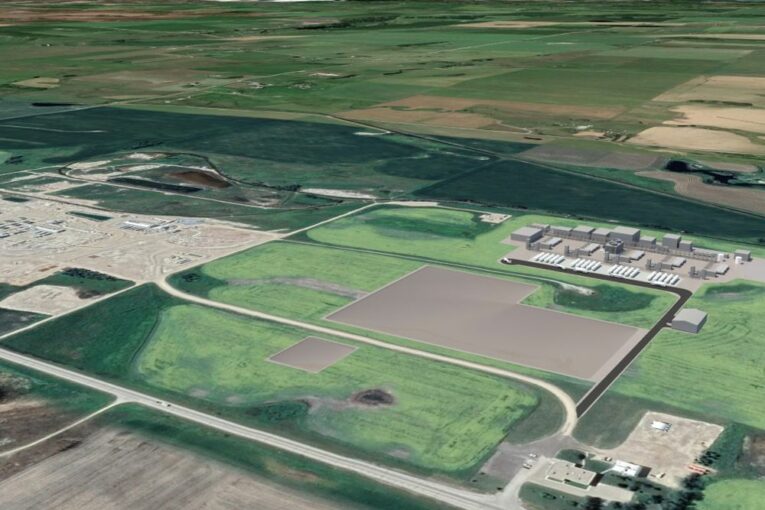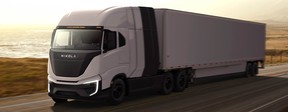
Calgary-based TC Energy Corp. announced Tuesday that it has begun evaluating plans for a hydrogen production hub on a site near Crossfield, Alberta, where the company currently operates a natural gas storage facility.
The pipeline company is working with U.S. electric vehicle startup Nikola Corp. on feasibility for the project which could eventually see the construction and operation of a large-scale hydrogen production facility to distribute fuel for long-haul electric trucks, as well as energy for residential and commercial heating and power generation.
“It shows how we can leverage our existing footprint and our existing assets to participate in the energy transition,” said Corey Hessen, president of TC Energy’s power and storage division, in an interview.
“Geographically, it’s located in a location where it’s sort of a confluence of mobility opportunities, potentially, and then also some of our other historical customers.”
The initial phase would see the hub producing an estimated 60 tonnes of hydrogen per day using natural gas, with the capacity to increase to 150 tonnes per day in the future. CO2 generated during production would be captured and stored underground in order to reduce emissions, resulting in a product sometimes called “blue” hydrogen.
The proposed site located at TC Energy’s Crossfield gas storage facility, 50 kilometres north of Calgary, is on a key transportation corridor, the company said.
Hessen said based on very preliminary estimates, the cost of the project could range between $400 million and $800 million, based on an estimated capital expenditure of $10 million per tonne.
“It’s early days, so we don’t know exactly what that demand will be. Sizing will be a function of the demand that we can create with our customers,” Hessen said.
TC Energy first announced the partnership with Nikola last fall. The Arizona-based company manufactures zero-emission vehicles and has specialized in heavy duty transportation.
“(It) allows us to now market and place trucks into customers’ hands, which they’re eager to receive, and we start moving heavy duty transportation to a cleaner future,” said Pablo Koziner, Nikola’s president of energy, told the Financial Post.
“The vehicles are in an early demo phase in their development. We have two currently operating in the Los Angeles area… and we are positioning ourselves to be able to start commercial production of fuel cell trucks at the end of 2023.”

The project’s proponents have said previously that hydrogen would likely initially be produced in a liquified form and transported by truck to fuelling stations and other industrial users. TC Energy could look at using existing pipelines to transport hydrogen or build new pipelines.
TC Energy operates a broad network of natural gas and liquid pipelines, power generation and storage facilities in Alberta, spanning into eastern Canada, parts of the U.S. and Mexico.
The news comes as entrepreneurs, experts and government officials descend on Edmonton this week for the first-ever Canadian Hydrogen Convention.
Alberta’s associate minister for natural gas and electricity hailed the start of the convention Monday, calling hydrogen a “once-in-a-generation opportunity” for the province to diversify its energy sector.
Alberta is already Canada’s largest hydrogen producer, manufacturing about 2.4 million tonnes of hydrogen annually, and the province’s UCP government is hoping to grow the industry further with big ambitions for the export market.
Experts say hydrogen could play a key role in the decarbonization of some emissions-intensive sectors, including long-haul trucking, as well as providing a feasible option for decarbonizing the electricity grid.
Several hydrogen projects have been announced in Alberta in the last two years, though critics say there are still obstacles in the way, including the need for more investment certainty and timely approvals for infrastructure.
“When you see actual heavy highway tractors coming off the assembly line that are going to run on hydrogen, and then you see the actual trucks they manufactured on demo tests in southern California — it starts to make you more of a believer, I think,” Hessen said.
[email protected] Twitter: @mpotkins
You can read more of the news on source
